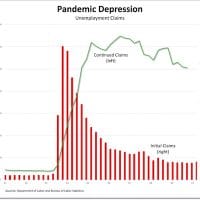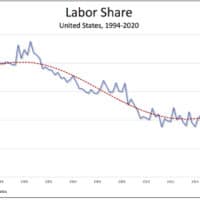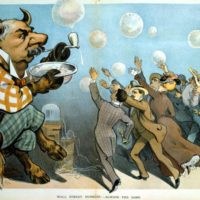-
US Imperialism in Crisis: Opportunities and Challenges to a Global Community with a Shared Future
1. Introduction The predominance of US economic, political and military power in the world was established at the end of the Second World War.1 With just 6.3 percent of global population, the United States held about 50 percent of the world wealth in 1948. As the only power which had used nuclear weapons on civilian […]
-
The stagnation of the world economy
The fact that the world economy has slowed down since the financial crisis of 2008 is beyond dispute.
-
Recession alert: we need a new unemployment insurance system
With the Federal Reserve pushing up interest rates, we appear headed for a new recession.
-
Europe’s self destruction
Despite the economically disastrous impact the Nord Stream pipeline sabotage will have on Europe, Western media still holds its tongue about it.
-
USA: World’s largest producer of oil AND its largest oil consumer
According to an analysis by Elements Newsletter based on the BP Statistical Review of World Energy 2022, roughly 43% of the world’s oil production came from just three countries in 2021 — the US, Saudi Arabia, and the Russian Federation. Together, these three countries produced more oil than the rest of the top 10 combined.
-
What is Celsius and why is it crashing?
The crypto lending platform paused withdrawals as Bitcoin spiraled downwards, sending its own token plummeting. Here’s what happened.
-
The Indian economy is heading for a stationary state
ADAM Smith and David Ricardo had been haunted by the idea of capitalism ending up in a “stationary state”, by which they meant a stable state of zero growth.
-
Financialization at heart of economic malaise
COVID-19 has exposed major long-term economic vulnerabilities. This malaise–including declining productivity growth–can be traced to the greater influence of finance in the real economy.
-
Chávez the Radical XXVI: ‘What are Privatizations?’
The Bolivarian Revolution represented a break from neoliberal governments. Is the tide turning? Tatuy TV examine that in this episode of “Chávez the Radical.”
-
India’s post-pandemic economic recovery
The pandemic alas is not yet over, but there are no economic disruptions in the current fiscal year in the form of lockdowns or workers’ absence. The economy’s performance therefore can no longer be attributed to the prevalence of the pandemic; whatever it is, it is caused by economic factors.
-
Manufacturing stagnation
Intellectual property, industrial organization, and economic growth.
-
Chart of the day
U.S. billionaires have recouped all of their wealth—and more—during the Pandemic Depression. Meanwhile, since May, the number of poor Americans has grown by about 8 million.
-
A missing pledge in the 2020 Democratic Party platform
For 52 years—from 1936 to 1988—the Democratic Party pledged support for the achievement of full or maximum employment.
-
Struggles in social reproduction during COVID-19: from East to West and beyond
The COVID-19 pandemic showed, more than anything, the deep interconnectedness and mutual dependence of different sectors, areas of life, and countries and regions within the global capitalist system.
-
Reserve army—pandemic edition
In particular, the existence of a reserve army serves to discipline labor, keeping its wage demands in check, since employed workers are forced to compete with unemployed and underemployed workers for the available jobs.
-
The jungle—pandemic edition
Like nursing homes, the U.S. meatpacking industry has become one of the hotspots of the novel coronavirus pandemic.
-
UN Chief warns of coming recession for the Planet
Bumping elbows at the United Nations.
-
Inflation & the Politics of Pricing with Nathan Tankus
In this episode, we talk with Nathan Tankus, Research Director of the Modern Money Network, and Research Fellow at the Clarke Business Law Institute at Cornell Law School. We ask Nathan to expand upon and deepen his engagement with the inflation question in all its historical, political, and rhetorical complexity.
-
Why stagnation?
The U.S. economy has been stuck in stagnation for a decade. The GDP growth rate has been only 2.2% per year since the recovery from the Financial Crisis and Great Recession of 2008-09 began. That is far below the growth rate in past post-recession recoveries since the end of World War II.
-
Scientists against the machine
Jane Shallice examines the history of radical research at the British Society for Social Responsibility in Science.

![A late 1940s Soviet poster showing a US military service member lounging on top of a German factory, smoking a cigar. The text beneath reads DER DOLLARIMPERIALISMUS [dollar imperialism].](https://mronline.org/wp-content/uploads/2025/04/Confuse_and_Control_Department_of_State_Publication_4107_1951_-_Soviet_propaganda_line_-_Dollar_imperialism_the_enemy_of_the_German_people-e1744342177232-200x200.png)


















